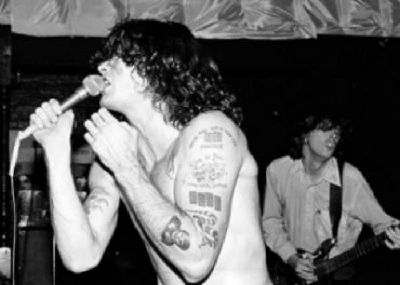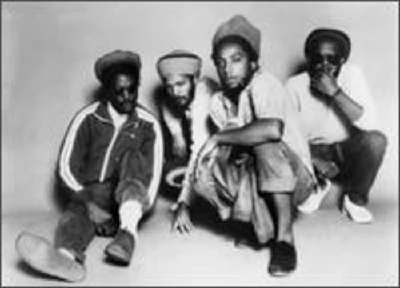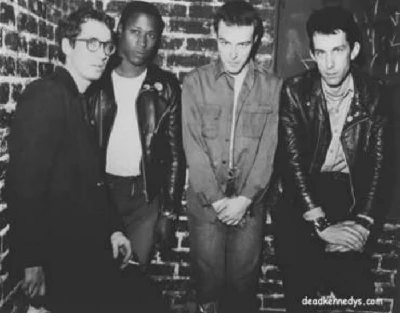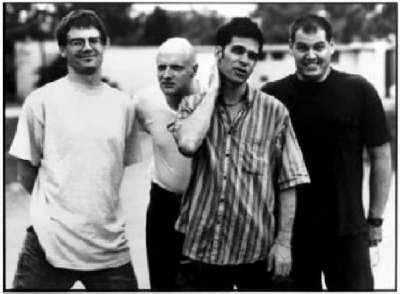Miscellaneous
-
Part 1-The Early Years 1977-1986
published: 16 /
1 /
2003

In the first in a series profiling the rise of American hardcore, Mark Rowland examines its early years and the long-term impact of five of its best known bands, Minor Threat, Black Flag, Bad Brains, the Dead Kennedys and the Descendents
Article
Introduction
As the 80's loomed on the horizon, the UK pretty much waved goodbye to punk. The Pistols were long gone, the Clash had broadened their influences, and the majority of punk bands had swapped their guitars for synths as the original purveyors of eighties pop music took their first baby steps towards a new Kraftwerk influenced sound. Still, it had been nice while it lasted.
At the same time, across the pond, kids in America who felt the
same disillusionment as British punks were picking up guitars, and making punk rock their own. This punk music had a lot of the same elements as British punk rock- the three chords, the anger, the complete lack of musicalknowledge- but American punk was a lot faster, harder hitting, and possibly even angrier than their predecessors. It would eventually be known as hardcore, and over the last twenty years, has mutated into many different sub-genres, but more on that later.
This article, the first in a series, will concentrate on the beginning stages of hardcore in the early 80's,but as there were so many excellent bands from that period, will focus on five of the very best.
Firstly, let's set the scene. There were two main areas of
America where punk thrived; California (especially Los Angeles and SanmFrancisco), and Washington DC. Both scenes had similar sounds, but the lifestyles behind the scenes were quite different. The Washington scene had its Straight Edge movement, pioneered by DC's Minor Threat and their song 'Straight Edge', which was strictly against drinking, smoking and doing drugs. The Californian scene, however, was less strict when it came to those vices. Perhaps it's connected to this difference, and perhaps it's not, but the way in which the different scenes developed was very different.
Minor Threat
As they've already been mentioned, we might as well start by
talking about Minor Threat. The band was formed in 1980 by vocalist Ian MacKaye, guitarist Lyle Preslar, bassist Brian Baker, and drummer Jeff Nelson. Their sound was stripped down and angry, basically the blueprint for early hardcore, and they also created what is now one of the world's premier punk labels, Dischord.
Their first two EP's were sloppily played, but contained many of their defining statements, such as the aforementioned 'Straight Edge', 'Minor Threat', 'I Don't Wanna Hear it', 'Bottled Violence' , and 'In my Eyes'. MacKaye's lyrics were all comments on social issues- Drunken violence, peer pressure, drug abuse, amongst others,and always brimmed with disgust. When MacKaye screams "You tell me I make no difference/Well at least I'm fucking trying" on 'In my Eyes', you can't help but admire his belief in what he is singing about. Their first and only album, 'Out of Step',was released in 1983, and displayed a slight refinement in the band's sound.A final EP, 'Salad Days', and the band decided that they'd said all they needed to say, and split up.
Dischord, however continued to release albums, and the band members have appeared in several other bands over the last twenty years. The band's entire recorded output was combined on one album,'Complete Discography', which is most definitely recommended listening.
Black Flag
Meanwhile, on the Californian coast two years previously, a
hardcore band called Black Flag were about to release their defining statement. 'Damaged', the first album to feature Henry Rollins on vocals, was the most focused work the band had released to that point, and is the album people think of when they think of Black Flag.
The band had formed in 1977, the brainchild of guitarist Greg Ginn, and originally featured bassist, Chuck Dukowski, Robo on drums, and singer Johnny 'Bob' Goldstein (A.K.A. Keith Morris of the Circle Jerks). Like Minor Threat, Black Flag had their own label, SST records, which also became an important punk label.
Things did not always run smoothly for the band. When recording their debut release, 'Jealous Again', Goldstein quit the band, and their singer changed again before the EP was completed. Firstly Chavo Pederast, who re-recorded Goldstein's tracks, took over on vocals and then he in turn was replaced by Dez Cadena. Cadena eventually became the band's second guitarist, and Black Flag found a new singer in Henry Rollins, who made his first recorded appearance on the song
'Damaged'. Rollins combined the brutal anger of the band's previous outputs,but combined it with an intelligence that gave the band greater focus and greater credibility behind their statements.
The Black Flag sound also expanded to take in spoken word (the band would provide a musical backing to Rollins' poetry readings) and elements of Sabbath-esque metal. The band released too many albums to mention over the subsequent years, until, one line-up change later (the Rhythm section left in the mid-eighties, Kira Roessler, the replacement bassist, was one of the only women in a hardcore band at the time) the band came to the end of their tether, and split in 1986.
Henry Rollins, however, is still going strong with both his poetry and his current group, the Rollins band.
Bad Brains
Seminal band number two from Washington DC, and it's a pretty
special one. Bad Brains were almost definitely the first all black punk band, and were probably the most musically talented band of the hardcore scene, influenced by dub and reggae as much as they were influenced by punk rock.
They first appeared on 'Let Them Eat Jellybeans', an Alternative
Tentacles compilation which featured 'Pay to Cum', the band's debut single.
The band released a rare cassette only self-titled album in 1981, and although the recording quality was bad, the band's potential could be heard. Their next album, 'Rock for Light', released in 1981, was their first landmark album. On tracks like 'Banned in DC, 'Sailin' on', 'Rock for Light' and 'At the Movies', the band combined ultra-fast yet tuneful punk with metal elements, while 'I and I survive', 'The Meek', and 'Rally Round Jah Throne' showed that the band also excelled at making dub music. Twenty years on, and hardcore punk fans are still going on about this album.
It would be a good three years before Bad Brains returned with another album, 1986's 'I Against I', released on Black Flag's SST records, was their second seminal moment. The sound of 'Rock for Light' was basically completely scrapped, as the band slowed the pace considerably, and took in new influences, such as funk.
This was pretty much the end of the band, as vocalist H.R and drummer Earl quit the band shortly after the release of 'I Against I', leaving guitarist Dr. Know and bassist Daryl Jennifer to continue with Mackie, former drummer of the Cromags, and former Faith no More vocalist Chuck Mosely. The original line-up has re-formed and split again several times since, but their output has never rivalled that of their early 80's albums.
Dead Kennedys
San Francisco's the Dead Kennedys have had probably one of the biggest influences on punk rock today, basically being hardcore punk's answer to the Sex Pistols. In fact, the Sex Pistols were a big influence on the band, with vocalist Jello Biafra and guitarist East Bay Ray forming the band after seeing the Pistols play live. Their sound was obviously influenced by English punk, but lyrically, the band made intelligent statements about American politics in a satirical way.
The band, completed by drummer Bruce 'Ted' Slesinger (later replaced by D.H. Peligro), bassist Klaus Flouride, and occasional guitarist 6025, met with problems from the begiining of their career. Their name and publicity stunts like running for mayor of San Francisco (Jello came fourth) attracted them the attention of several political and religious groups, and there was always a big police presence at the DK's gigs.
This scared labels into not signing the band, so, unsurprisingly, the band formed their own label, Alternative Tentacles. The Dead Kennedys first album, 'Fresh Fruit for Rotting Vegetables', despite being a bit under-produced, featured such classics as 'Kill the Poor', the oft covered 'Let's Lynch the Landlord', 'Chemical Warfare', the brilliant 'California Über Alles', 'Holiday in Cambodia', and a great cover of 'Viva Las Vegas'.
Their next release was the EP, 'In God We Trust Inc.' which as the title suggests, mainly ranted against the corporate nature of America's religious organisations, and included another hardcore punk classic, 'Nazi Punks ---- off'. Over their subsequent three albums, 'Plastic Surgery Disasters', 'Frankenchrist' and 'Bedtime for Democracy', the band maintained wit and articulacy with their political attacks, while expanding their sound to give it a slightly psychedelic edge. The band, however, split amicably just before the release of 'Bedtime for Democracy', although since then, its members
have taken each other to court over royalties distribution.
Descendents
The last band of this piece is in no way the least. The geeks of
early 80's hardcore, The Descendents took a much different stance from their contemporaries when it came to the subject matter of their music, which tended to be about the more pressing teenage issues of girls, parents, and not being a loser.
The Descendents were formed in 1980 in Los Angeles by vocalist Milo Aukerman, guitarist Frank Navetta, drummer Bill Stevenson and bassist Tony Lombardo, and first appeared on the scene with the 'Fat' EP.
Their sound was slightly more hooky than most hardcore bands, and contained extremely short songs about fast food, their parents, and er, a bass (as in the fish).
Their debut full-length, 1982's 'Milo Goes to College', would
prove to be the definitive opus of loserdom. Songs like the fantastic 'Hope' covered feelings of sexual frustration, songs like 'I'm Not a Loser' speak out against people who don't understand their lifestyle, while tracks, like 'I Wanna Be a Bear' add extra humour to the album. All of this is done with a surprising grasp of pop sensibilities, while still remaining decisively punk. It was after this album release, however, that Milo did the unthinkable- he actually went to college. This put the band on hiatus for a good three years, and many say, signalled the end of early hardcore punk. The band did release several other albums after Milo got out of college, 'I don't Want to Grow up', 'Enjoy', and 'All', all of which showcased greater pop sensibilities, but failed to recapture the magic of their early releases.
Next month: Part 2- Punk learns how to play: hardcore in the late 80's and early 90's.
Picture Gallery:-



